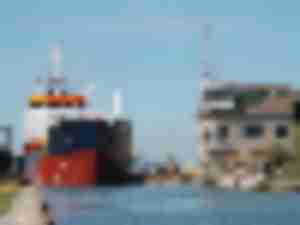Seaway Negotiations Resume
St. Lawrence Seaway Management Corporation (SLSMC) announces that negotiations with UNIFOR are scheduled for Friday morning, October 27th, as confirmed by Government of Canada’s Federal Mediation and Conciliation Services.
Port of LA’s Seroka reports 5% volume increase in September
The Port of Los Angeles reported a 5% volume increase in September moving 748,440 TEUs, according to Executive Director Gene Seroka.
How pharmaceutical brands can be resilient Let’s approach supply chain resilience holistically
With pharma often in the news these days (e.g., with recent drug reforms), would you be interested in a piece that focuses on how the sector can make its supply chains stronger?
Strike by Canadian Seaway workers shuts down binational waterway
Some 361 workers in Ontario and Quebec began a strike on Sunday at 00.01 am after negotiations failed to meet a union-imposed deadline with Canada’s St. Lawrence Seaway Management Corporation (SLSMC). The first such work stoppage since 1968 on the bi-national waterway and important supply chain corridor stirred a big cry of alarm not only from Canadian marine industry and business circles but also from U.S. Great Lakes ports urging Canada’s federal government to intervene.
Strike notice threatens St. Lawrence Seaway shutdown as of Sunday
The St. Lawrence Seaway, the maritime trade corridor connecting the Atlantic Ocean to the industrial heartlands of Canada and the United States, could be closed to all traffic as of 00.01 hours on Sunday should the 361 Canadian unionized workers carry through their threatened strike action.
DP World’s increased involvement in India’s port infrastructure development expected
DP World’s mega-container terminal at Port in Gujarat could boost external trade
Ports Long Beach and Los Angeles support $1.2 billion hydrogen grant funding
Port of Long Beach Executive Director Mario Cordero said that projected $1.2 billion in hydrogen fuel grants to California would aid the Ports of Long Beach and Los Angeles in...
Harbor truckers facing tough times says Impact Transportation’s Cancilla
The Oakland California-based Impact Transportation transports imports and exports on a 50% to 50% basis...
Federal funding announced for Port of Montreal Contrecoeur project
The Canadian government has announced funding of $150 million for the Port of Montreal’s massive Contrecoeur terminal project whose cost has reportedly ballooned from C$950 million to over C$1.4 billion.
British-American’s Snell: Ag exporters facing tough 2023
British-American is a California-based licensed Ocean Transport Intermediary (OTI) / Non-Vessel Operating Common Carrier (NVOCC). It operates as a ...
© Copyright 1999–2025 American Journal of Transportation. All Rights Reserved










